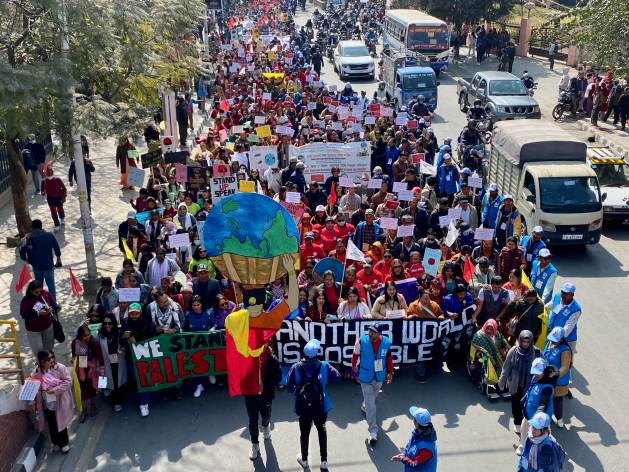 Participants await the opening ceremony. World Social Forum 2024 in Kathmandu, 15 February. Credit: Marty Logan / IPS
Participants await the opening ceremony. World Social Forum 2024 in Kathmandu, 15 February. Credit: Marty Logan / IPSKATHMANDU, Feb 15 (IPS) - These are the worst of times, but they can become the best of times, said speaker Dr. Walden Bello, seeking to inspire thousands of progressives who gathered for the World Social Forum (WSF) in Kathmandu on Thursday with the planet under clouds of armed conflict and assaults on democracy.
“We have a climate catastrophe facing all of us,” continued Bello after quoting from Charles Dickens’ A Tale of Two Cities. “We have neoliberal capitalism despite the fact that it has proven to be false in all its assumptions,” added the renowned Filipino academic and champion of the global South.
“We have the global rise of fascism, fascism which wants to put one group of people under the domination of another group of people,” Bello told thousands who had gathered under a hot winter sun in a huge field in the centre of Nepal’s capital.
Put bodies on the line
“But this can be the best of times despite the darkness that is in fact engulfing the world,” he continued. “What must WSF Nepal 2024 stand for? It must stand for the affirmation of all of us to save the planet from climate catastrophe and the ravages of capitalism. It must mean that we all stand up and put our bodies on the line against the emergence of fascism. And I would like to say it must mean that we put our bodies on the line against genocide,” said Bello.
Other speakers also singled out the ongoing attacks by the Israeli army on Palestine. “In today’s world, where armed conflicts are the order of the day, when mass genocide is carried out with total impunity we need to stand together for the people who need it the most… the Palestinian people,” said Dr. Aleida Guevara, the oldest daughter of Cuban revolutionary Che Guevara.
“The situation is very difficult, but what do we do about it? Nothing, or almost nothing. What is clear is that it is not enough. The Palestinian people continue dying,” she added. “We need to do better by being more supportive… South Africa cannot be alone in the mission of demanding more justice and punishment for those who have become the worst murderers of humanity.”
The day began with a march through the vehicle-clogged centre of Kathmandu, a city of about 5 million people. Some teams hefted long banners while solo marchers hoisted colourful hand-written signs proclaiming support for issues ranging from debt relief to the fight against caste discrimination and sex workers’ rights.
Between 30,000 and 50,000 people from 90+ countries are expected to attend more than 400 workshops, talks and other events of this WSF, whose motto is “another world is possible”. The event ends on Monday.
At the opening ceremony other speakers on the huge stage noted that the working poor worldwide are facing sustained attacks on their ways of life.
Farming activist Burry Tunkara, from The Gambia, told participants: “There’s no doubt that agriculture forms the greatest part of the economy of Africa and of the world at large… small-scale farmers lack formal land rights, making them vulnerable to land-grabbing, displacement and exploitation.
“We need to empower farmers, especially women and youth, through trainings… and also education… By investing in women and youth, we can unlock the potential of the agriculture of the world and also contribute to gender equality and social development,” she added.

First WSF in 2001
The first WSF was held in 2001 in Porto Alegre in southern Brazil, at the initiative of Brazilian organizations and social movements and in coordination with international groups. But the event has been in decline in recent years.
“We are losing the game so far,” co-founder Obed Grajew recently told IPS by telephone from Sao Paulo. “The climate crisis has worsened, inequalities and conflicts have grown, with the risk of nuclear war, confidence in democracy is declining and global governance is lacking. These are enormous risks that threaten the human species.”
WSF 2024 will demonstrate that global civil society still has a strong voice, said Netra Timsina, a member of the Nepal organizing committee. “There is still a vibrant voice alive and speaking out against what is happening: genocide, war, climate catastrophe, populism, inequality.”
Nepal organizers want to both share and protect their achievements following the end of the Maoist-state conflict in 2006, he added: “our republic and the secular constitution, our peace process and human rights and democracy.”
Ahead of the opening ceremony, IPS spoke with Indian activist Skani Pinto, who has worked for the rights of Indigenous people for 40 years. Asked if he was getting tired of the struggle he answered: “We must fight, we must raise our voice… we all have equal rights and dignity, so we work for the world family. This is our inner calling; it doesn’t allow us to think in any other way.”
© Inter Press Service (2024) — All Rights Reserved
Comments
Post a Comment